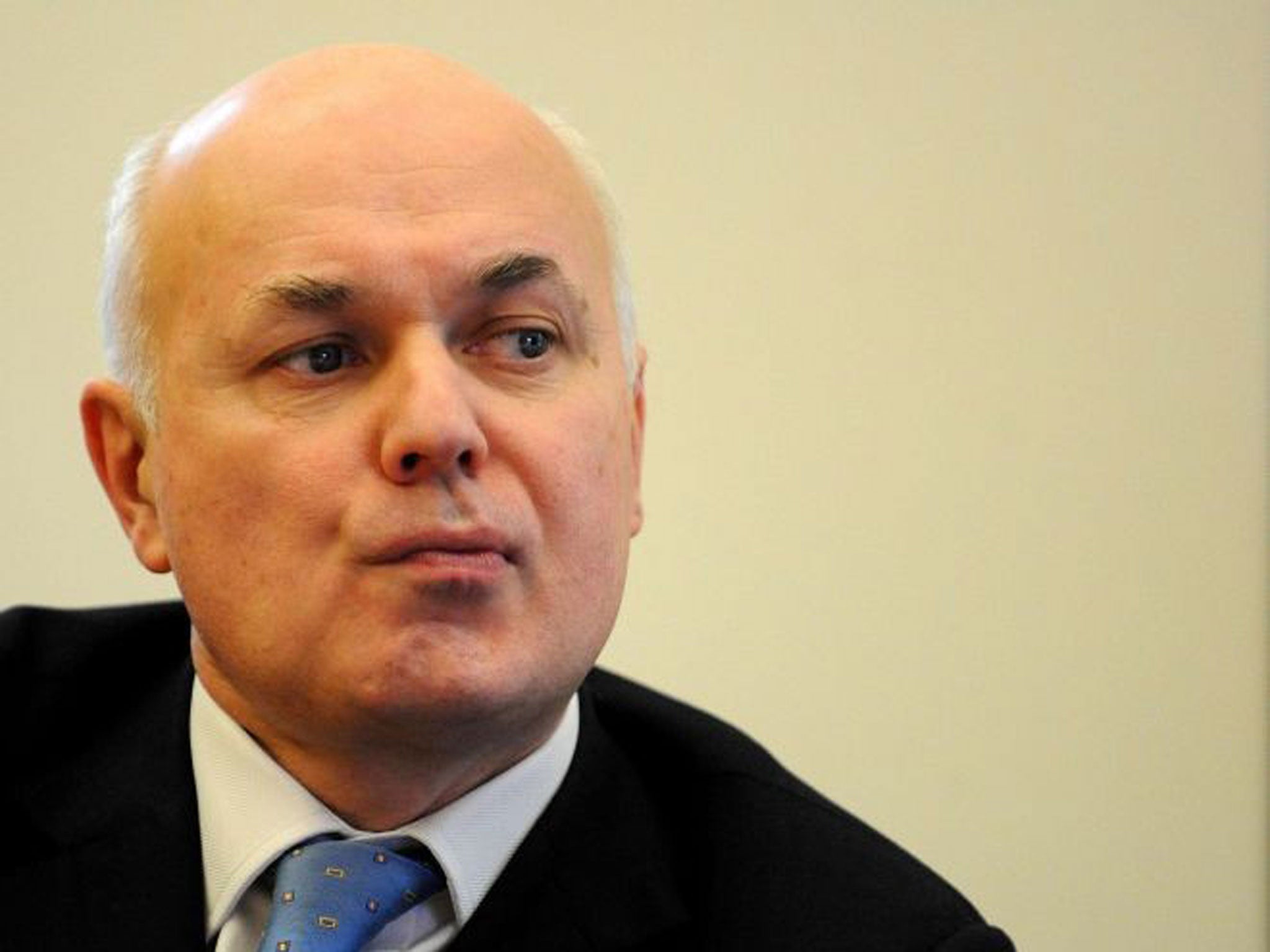Benefits cap row: Iain Duncan Smith accused of relying on 'dodgy' statistics to justify household cut-off

Iain Duncan Smith was accused on Monday of relying on “dodgy” statistics to justify the Government’s £26,000-a-year benefits cap for each household.
The Work and Pensions Secretary said that more than 12,000 people had moved into work after being told about the £500-a-week cap for families and £350-a-week ceiling for single people.
Labour seized on the small print of a Department of Work and Pensions progress report issued as the welfare cap, which has been trialled in four London boroughs, was rolled out nationally from on Monday. It said: “This analysis is confined to correlation and does not show causation”.
The qualifying statement follows a rebuke for Mr Duncan Smith’s previous claim about the number of people taking jobs as a result of the benefits ceiling. In May, he was criticised by the independent UK Statistics Authority.
On Monday, his department cited a poll it commissioned by Ipsos MORI of 500 people who were told their state handouts would be capped. The survey found that 61 per cent of the group now in work found their current job after being told about the cap. But critics said there was no proof that they would not have found work anyway or that the policy was responsible. In Haringey, one of the trial areas, only 30 of the 734 claimants affected by the ceiling are said to be in work.
Alison Garnham, chief executive of the Child Poverty Action Group, said: “This polling only demonstrates the paucity of evidence for the benefit cap. [It] reflects the fact that most people hit by the cap have worked and will soon work again. It’s also unhelpful for public policy and quite misleading to the public for the spin to run ahead of the facts through repeating dodgy claims about the effect of the policy on people moving into work when the evidence is clearly not there to back up these claims.”
Liam Byrne, the shadow Work and Pensions Secretary, said: “Iain Duncan Smith is having to make things up as he goes along because his policies are failing. Even the [DWP] report he hides behind makes absolutely clear that there is no evidence for his claims. It is simply incredible that the Work and Pensions Secretary thinks it is acceptable to operate his department on guess work and blind faith.”
An unrepentant Mr Duncan Smith accused the BBC of “seeking out lots of cases from people who are politically motivated” . He clashed with John Humphrys, presenter of Radio 4’s Today programme, who reminded him of the Statistics Authority’s ticking off. Mr Duncan Smith replied: “No. What they [the Statistics Authority] said was that you can't absolutely prove that those two things are connected.”
Mr Humphrys then quoted the independent authority as saying the minister’s statement was "unsupported by the official statistics published by your own department". Mr Duncan Smith replied: “Yes, but by the way you can't disprove what I said either.”
“You can make any claim on that basis,” Mr Humphrys replied.
“Well, I am. I believe this to be right. I believe that we are already seeing people go back to work who were not going to go back to work until they were short of the cap,” Mr Duncan Smith countered.
He told Mr Humphrys: “What you’re doing, as always in the BBC, you’re seeking out lots of cases from people who are politically motivated to say this is wrong ... The fact is that people will not be earning more than average earnings sitting out of work unless they are in exempt categories.”
The Work and Pensions Secretary claimed that predictions that the benefit cap would lead to thousands of people becoming homeless had not materialised. “The homeless figures have hardly moved at all,” he said.
He also rejected claims that the ceiling would force families to move out of London. “The vast majority of the areas in London – a third of all rentable accommodation in the private sector – is available for those who are on social rents,” he said.
But Ruth Davison, director of the National Housing Federation, warned: “In many parts of the country, families won’t be able to pay high private rents because of the cap. There will be more demand for than ever for affordable housing, particularly in Greater London where nearly half (49 per cent) of the people affected by the benefit cap live.”
She added: “Families could face the stark choice of cutting back on essentials or having to move away long distances from their support networks to look for cheaper places to live. Until we see a long-term affordable housebuilding programme that will drive down the price of rents for everybody, housing costs should be removed from the cap.”
Subscribe to Independent Premium to bookmark this article
Want to bookmark your favourite articles and stories to read or reference later? Start your Independent Premium subscription today.

Join our commenting forum
Join thought-provoking conversations, follow other Independent readers and see their replies